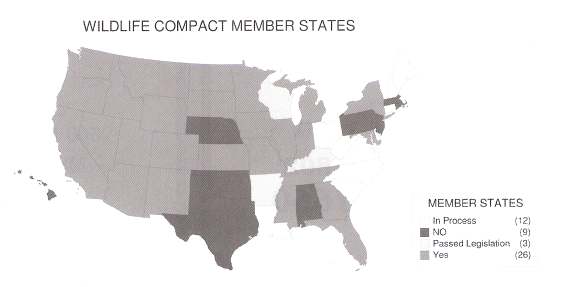
Interstate Wildlife Violator Compact
 In my report for this issue, I want to talk about the Interstate
Wildlife Violator Compact. An ever increasing topic (not in place
in OK as of yet) and a valuable law enforcement tool that has become
a very important issue nationwide is the Interstate Wildlife Violator
Compact (IWVC). To those not familiar, the IWVC is a law enforcement
cooperative agreement between fish and wildlife agencies across
the nation. It was a concept initiated in the early 1980's. Law
enforcement divisions of state wildlife agencies that were members
of the Western Association of Fish and Wildlife Agencies discussed
a method to deter wildlife crime, especially among highly mobile
violators. Those states already had high volumes of nonresident
hunters traveling into their state from around the country to hunt
or fish. The problem that surfaced was violators who were charged
with wildlife violations would then return to their home states,
refusing to comply with the terms of their arrest. They either
refused to pay the fine or return to court. Usually there were
little or no repercussions for the noncompliant violator. Unless
the violator was encountered on a return trip to the state of violation
(where he could be re arrested on a warrant), and since most wildlife
violations are misdemeanors not subject to extradition, they often "skipped
out" on their responsibility. Even if the crime were a felony,
there was often a reluctance to extradite wildlife violators. These
violators of course continued to hunt and fish in their home states
and in other states (avoiding the offended state) without risk
of arrest. In fact, some chronic violators were intentionally taking
their illegal hunting ethics into other states knowing they would
just 'run'.
In my report for this issue, I want to talk about the Interstate
Wildlife Violator Compact. An ever increasing topic (not in place
in OK as of yet) and a valuable law enforcement tool that has become
a very important issue nationwide is the Interstate Wildlife Violator
Compact (IWVC). To those not familiar, the IWVC is a law enforcement
cooperative agreement between fish and wildlife agencies across
the nation. It was a concept initiated in the early 1980's. Law
enforcement divisions of state wildlife agencies that were members
of the Western Association of Fish and Wildlife Agencies discussed
a method to deter wildlife crime, especially among highly mobile
violators. Those states already had high volumes of nonresident
hunters traveling into their state from around the country to hunt
or fish. The problem that surfaced was violators who were charged
with wildlife violations would then return to their home states,
refusing to comply with the terms of their arrest. They either
refused to pay the fine or return to court. Usually there were
little or no repercussions for the noncompliant violator. Unless
the violator was encountered on a return trip to the state of violation
(where he could be re arrested on a warrant), and since most wildlife
violations are misdemeanors not subject to extradition, they often "skipped
out" on their responsibility. Even if the crime were a felony,
there was often a reluctance to extradite wildlife violators. These
violators of course continued to hunt and fish in their home states
and in other states (avoiding the offended state) without risk
of arrest. In fact, some chronic violators were intentionally taking
their illegal hunting ethics into other states knowing they would
just 'run'.
A federal law was already in place that allowed compacts among
states to address crime issues.
Public Law No. 293, H.R. 7353 was passed June 6, 1934 and re codified
May 24, 1949 as Title 4 U.S.C. Section 112. This law allowed states
to enter compacts for cooperation in prevention of all types of
crime and is in use (even in OK) for cooperative interstate motor
vehicle law enforcement. The section reads: "The consent of
Congress is hereby given to any two or more states to enter into
agreements or compacts for cooperative efforts and mutual assistance
in the prevention of crime and in the enforcement of their respective
criminal laws and policies, and to establish such agencies, joint
or otherwise, as they may deem desirable for making effective such
agreements and compacts." With this as a basis, some western
states entered into an agreement concerning enforcement efforts
in 1989. Oregon, Colorado and Nevada passed enabling legislation
that year which gave birth to the IWVC.
 What the IWVC does is treat the wildlife offender the same in
all the other (compact) member states as they would be treated
in the state of the offense. For example, if an offender from Missouri
(a compact member), has his hunting or fishing privileges suspended
in Kansas (also a compact member), his privileges would also be
suspended in Missouri as well as all the other member states. Under
the IWVC, member states can suspend licenses for nonpayment of
fines in other member states. This can be a
significant deterrent to violators when they realize they are subject
to such sanctions. It prevents them from going to other member
states and continuing to hunt and creates a powerful incentive
for offenders to take care of their violations (penalties). Further,
it would serve as a deterrent for re offending.
What the IWVC does is treat the wildlife offender the same in
all the other (compact) member states as they would be treated
in the state of the offense. For example, if an offender from Missouri
(a compact member), has his hunting or fishing privileges suspended
in Kansas (also a compact member), his privileges would also be
suspended in Missouri as well as all the other member states. Under
the IWVC, member states can suspend licenses for nonpayment of
fines in other member states. This can be a
significant deterrent to violators when they realize they are subject
to such sanctions. It prevents them from going to other member
states and continuing to hunt and creates a powerful incentive
for offenders to take care of their violations (penalties). Further,
it would serve as a deterrent for re offending.
The IWVC is also a benefit to the offender and the arresting officers. Nonresident violators are often required in some states to be placed in custody and/or post a bond to ensure they will appear in court or comply with the orders of the court. IWVC member states are allowed to treat nonresident offenders the same as resident offenders because they there is confidence the impending court issues will not be ignored. Usually, this means the non resident violator will simply be cited and released on their own recognizance. For the officer, the agency, and the courts, this adds up to significant time savings and gives peace of mind that the offender will not escape justice once he returns home.
In 1999, the Utah Division of Wildlife developed a database that allows member states to enter suspension information that cross references their license database on subjects who are suspended from the purchase of licenses. At present, the IWVC has 26 member states. Three states recently passed legislation and 12 others have legislation in the 'joining' process. Nine states are presently not members including Oklahoma.
In our above example, the Missouri offender could come to Oklahoma to hunt though he was revoked in his home state, Kansas, and all the other IWVC member states. Conversely, if they got into trouble in Oklahoma and did not comply with requirements, our only recourse would be to file for arrest warrants (that would rarely be enforced).
Missouri would not suspend the violator (who visited OK) for nonpayment of a fine because we are not a member state. That warrant would only be served if the violator came back into our state. All wildlife violations are misdemeanors in Oklahoma. In our state, many nonresident violators are simply cited and released. If they choose to ignore the summons there is little we can do but have a warrant issued. So, maybe the time has come for our state to consider the benefits of being an IWVC member. It would require the legislature to pass enabling legislation to become a member. I know I favor it.
Editor's note: It has been said by some who are `nonmembers'
of the COMPACT that there is concern that the COMPACT would cause
agencies of the home states (of violators), to lose much needed
license revenues (from the revoked license the violator could no
longer be allowed to purchase), if agencies had to revoke a large
number of licenses belonging to a large number of violators. Wardens
believe this "large number" of violators would modify
their behavior in order to keep the license privilege and the future
of hunting depends on the nation's agencies taking this strong
stand ...together.
![]()